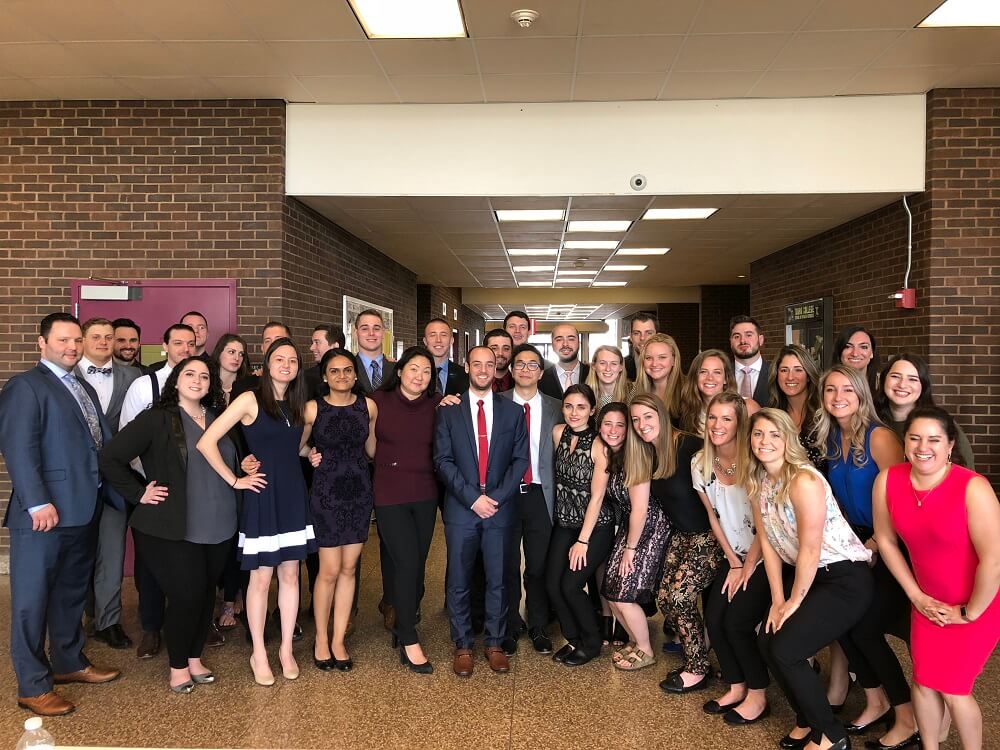Developing Critical Thinking Skills
Class of 2018 DPT Students Present Research Projects

For their final graduation requirements, students at the School of Health Sciences (SHS) Doctor of Physical Therapy (DPT) Program spend two years working on an evidence-based research project together with a faculty mentor. The fruits of their labor were on display in May, when both Manhattan and Bay Shore doctoral candidates delivered their final presentations.
“I am so incredibly impressed and proud of our students,” stated SHS DPT Chair Dr. Jill Horbacewicz. “This is the culmination of their three years in the DPT program and their efforts paid off. Many of these research studies will be presented at national conferences in the upcoming year. Throughout our program, we stress evidence-based practice and this really brings this point home because our students are contributing to that base of knowledge.”
“Knowledge is power,” said Dr. June Kume, an assistant professor and research coordinator for the Bay Shore campus DPT program. “Having our students doing research demonstrates not only what we know, but what we don’t know. In a sense, it’s beyond the research: it’s developing critical thinking skills that will help them when they graduate.”
Over the course of two mornings, the future physical therapists presented a wide array of research studies relevant to physical therapists. Research presentations included the use of low fidelity patient simulation as a teaching tool; the validity of a new measure of dynamic balance; the value of screening patients under 65 for falls; and the best position for the optimal use of an incentive spirometer, a medical tool to increase air flow (that presentation opened memorably with a discussion of the correct way to squeeze the remaining toothpaste out of tube. While there are no answers to that riddle, the group found that the best position to use the spirometer is sitting upright at the edge of the bed.)
The research both added on details to previous research projects and plugged holes in existing literature, like the group that discovered that physical therapists don’t routinely screen patients under 65 for fall risk.
DPT-Bay Shore candidate Frank Bertelle said the process was eye-opening for him. “We found that physical therapists don’t screen that many patients under 65 for a risk of falls, but we looked at a study from Jamaica Hospital that said that 57 percent of patients who were admitted for fall-related injuries were under 65,” he said.
As with many research projects, some studies led to unexpected findings.
DPT-Manhattan candidate Ariel Stoner studied the rate of injuries in triathletes compared to marathon runners. The group had expected to find less injuries in triathletes given the distribution of force in their bodies. That didn’t turn out to be the case.
“We found that athletes who participate in the Half-Iron Man Triathlon received more neck and back injuries than other marathoners,” Stoner said.
“The project gave me a better appreciation for the research process,” she said. “When I look at a study now, I can better evaluate and appreciate what went into it.”
DPT students also presented their research during the Touro-wide Research Day held on May 3 at TouroCOM Harlem. Alyssa Dormey was one of several dozen students who journeyed in from the Bayshore campus for the research day. She delivered a poster presentation on her group’s study of prosthetics curriculum in physical therapy programs across the country.
“We found that there are a lot of differences on how much time schools spend teaching about prosthetics and what they’re focusing on,” said Dormey. “We also looked at whether professors believe their students are ready to treat that population when they graduate. We’re hoping our study will spur the creation of a universal curriculum for teaching about prosthetics.”

